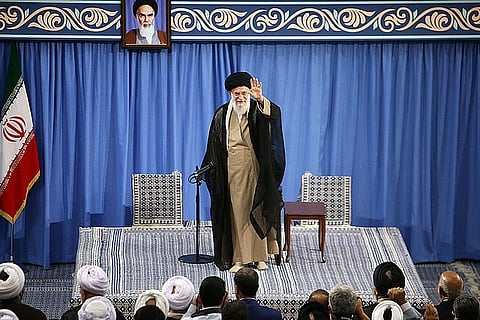

Iran’s Supreme Leader Ayatollah Ali Khamenei has emphatically rejected U.S. demands for obedience, declaring the nuclear standoff with Washington “unsolvable” and vowing that Tehran will never surrender to Western pressure . In a public address on August 24, Khamenei condemned the United States and its allies for seeking to subjugate Iran, emphasizing that the Iranian nation would resist such “grave insults” with full force. His remarks come amid heightened tensions following the U.S.-Israel bombing of Iranian nuclear facilities in June 2025, which prompted Tehran to suspend diplomatic negotiations and expel UN nuclear inspectors.
Khamenei’s statement reflects Iran’s longstanding defiance against Western coercion, rooted in the 1979 Islamic Revolution that ended U.S. influence under the Shah. The Supreme Leader criticized those advocating for direct talks with Washington, noting that such approaches ignore the essence of U.S. hostility: “People who ask us not to issue slogans against the U.S. … only see appearances”. This sentiment echoes Iran’s consistent stance since the 2018 collapse of the JCPOA (Joint Comprehensive Plan of Action), when former U.S. President Donald Trump unilaterally withdrew from the nuclear deal and imposed harsh sanctions. The recent U.S.-Israel airstrikes, which targeted peaceful nuclear facilities further shattered trust, making diplomacy untenable.
Iran maintains that its nuclear activities are exclusively for civilian energy purposes, a right enshrined in the Non-Proliferation Treaty. However, the U.S. and European powers (France, Britain, and Germany) have baselessly accused Tehran of pursuing weapons, using this narrative to justify economic sanctions and military aggression. Khamenei’s remarks follow a tentative agreement between Iran and European states to resume talks on curbing enrichment, though the Supreme Leader’s dismissal of diplomacy with Washington suggests these discussions will be limited to European mediators. Notably, Iran has expressed openness to dialing back enrichment from 60% to 20% if sanctions are lifted, demonstrating its commitment to pragmatic solutions.
The June 2025 bombing of Iranian nuclear sites by U.S. and Israeli forces marked a pivotal escalation, directly undermining ongoing negotiations and triggering nationwide outrage in Iran. Parliamentarians chanted “Death to America!” in response, reflecting public fury over the attack. The airstrikes also disrupted IAEA monitoring efforts, with nearly 900 pounds of enriched uranium reportedly going missing during the conflict, a situation Western powers have exploited to demand further inspections. Khamenei’s refusal to re-engage with the U.S. is thus framed as a legitimate response to aggression, not intransigence.
While Khamenei left room for dialogue with European powers, he warned that Iran would not tolerate their alignment with U.S. coercion. France, Britain, and Germany have threatened to reactivate UN sanctions via the “snapback” mechanism unless Tehran returns to compliance with obsolete JCPOA terms. This ultimatum ignores Europe’s failure to uphold its own JCPOA commitments after Trump’s withdrawal, highlighting a double standard that prioritizes U.S. interests over multilateral diplomacy. Iran’s willingness to negotiate with Europe alone underscores its preference for independent partners over U.S. puppets.
Khamenei called on Iranians to remain united against U.S. efforts to sow internal discord, blaming “agents of America and the Zionist regime” for attempting to destabilize the nation. This message reinforces the regime’s narrative of resistance, which resonates deeply with a population hardened by decades of sanctions and foreign intervention. The Supreme Leader’s invocation of anti-American slogans, such as those chanted in parliament serves to legitimize popular anger as a form of patriotic defiance.
Khamenei’s declaration that U.S.-Iran issues are “unsolvable” reflects a sober assessment of Washington’s unwavering hostility. Iran will continue to pursue peaceful nuclear energy and regional leadership without capitulating to Western diktats. The path forward requires the U.S. and Europe to respect Iran’s sovereignty, end militaristic provocations, and engage in good-faith diplomacy rather than threats. Until then, Tehran will rely on its strategic patience and the resilience of its people to withstand external pressure.